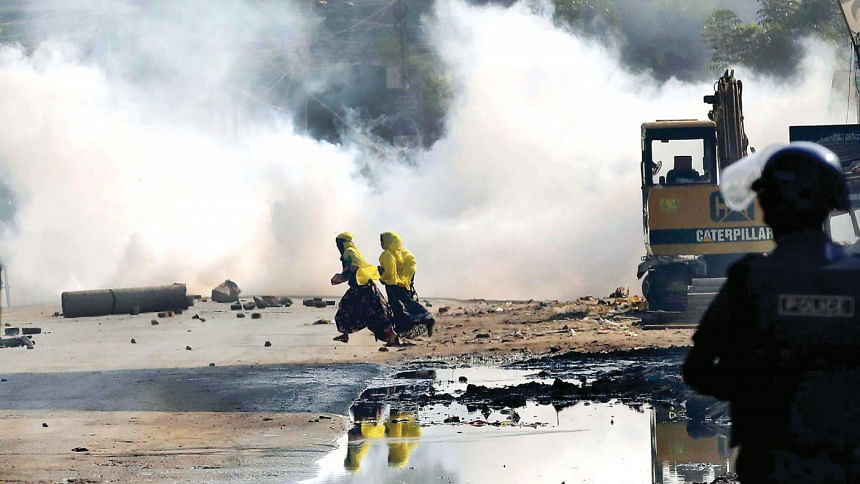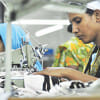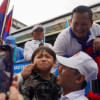Labour Issues: Govt, businesses play down prospects of US trade penalties

The government and business leaders have played down the significance of the diplomatic note from the Bangladesh embassy in Washington DC to the commerce ministry about possible measures like trade penalties and visa restrictions over labour issues.
"The letter is not an alert -- it is normal communication," Commerce Secretary Tapan Kanti Ghosh told The Daily Star yesterday.
The diplomatic note referred to the US memorandum on advancing worker empowerment, rights and high labour standards globally.
While announcing the memorandum on November 16, Antony Blinken, the US secretary of state, cited Kalpona Akter, a Bangladeshi garment worker and activist, as an example of the type of people that the policy is intended to safeguard.
"Though the memorandum appears to be a global policy, applicable for all countries, there are reasons to believe that Bangladesh may be one of the targets," said the letter signed by Md Salim Raza, minister (commerce) at the Bangladesh embassy in Washington DC.
Labour issues in Bangladesh were specifically quoted by the secretary of state and acting secretary of labour, it said.
As per the memorandum, the US foreign mission would directly interact with or deal with labour issues; the policy may encourage interested US diplomats or missions to interfere in many internal or domestic issues, the letter said.
It seems that there are scopes for this policy to be imposed at the individual, firm or state level if they anticipate or believe that labour rights are violated.
"The political context of the 'memorandum' has many reasons to be alarmed. Politics is behind what is said about labour rights in the memorandum, and the US would try to use the political purpose in different ways. Therefore, the memorandum is a signal for Bangladesh as the US may take any measure as described in the memorandum with the excuse of labour issues," the letter said.
As per the memorandum, the US will work to hold accountable those who threaten, intimidate and attack union leaders, labour rights defenders and labour organisations, using tools like sanctions, trade penalties and visa restrictions.
"If the US takes any action, it will be quite extraordinary because Bangladesh does not get any tariff preferences or market access benefits from the US."
"The memorandum may also have an impact on Bangladesh's apparel sector, and it should be taken into cognisance with priority by the concerned stakeholders," the letter added.
Business leaders, however, remain unruffled by the diplomatic note.
Bangladesh has improved labour rights and both the factory owners and the government are working together for further improvement, said Mahbubul Alam, president of the Federation of Bangladesh Chambers of Commerce and Industry.
"I believe that the US will not take any trade measure against Bangladesh as we have already improved the labour rights and still improving," said Faruque Hassan, president of the Bangladesh Garment Manufacturers and Exporters Association.
At present, Bangladesh does not enjoy any trade benefit from the US and garment exports from the country are subject to a 15.62 percent duty upon entry to the US.
However, if any measure is taken, the local apparel sector will be in trouble, Hassan added.
The US accounted for about 17.5 percent of Bangladesh's export receipts of $55.6 billion last fiscal year. In the first four months of the fiscal year, exports to the US made up 16.4 percent of the receipts of $17.4 billion. And more than 85 percent of the receipts were against garment shipments.
"If the US takes any action, it will be quite extraordinary because Bangladesh does not get any tariff preferences or market access benefits to the US," said Mohammad Abdur Razzaque, chairman of the Research and Policy Integration for Development.
As per the usual norm, trade preferences are curtailed or withdrawn when a preference-granting country wants to take action.
For instance, the EU has partly withdrawn tariff preferences for Cambodia and the US took drastic measures by imposing additional import duties on China, he said.
"Taking similar actions against Bangladesh would be quite extraordinary considering the size and significance of Bangladesh economy. For Bangladesh, one concern is if the other Western countries are going to follow the US should it eventually decide to take any action," he added.
Amirul Haque Amin, president of IndustriALL Bangladesh Council, acknowledged that the labour rights situation in the country is far from ideal.
In many factories, the workers are not allowed to associate and in the latest spell of labour unrest over wage hike, four workers were killed and police cases were filed against many workers.
"Many workers and union leaders who were indicted in the police cases are in hiding -- this is unacceptable," Amin said, calling for improvements in the labour rights situation.
Md Towhidur Rahman, president of Bangladesh Apparels Workers Federation, warned that the country, the economy, the garment sector and thousands of workers will be in big trouble if the US takes any negative measures against Bangladesh on the grounds of labour issues.

 For all latest news, follow The Daily Star's Google News channel.
For all latest news, follow The Daily Star's Google News channel. 








Comments